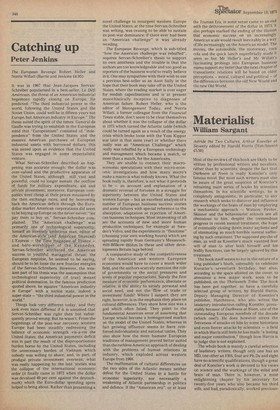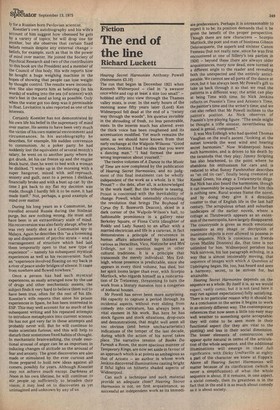Materialist
William Sargant
Astride the Two Cultures, Arthur Koestler at Seventy edited by Harold Harris (Hutchinson 0.50) Most of the reviews of this book are likely to be written by professional writers and novelists, rather than by scientists, despite the fact that Darkness at Noon is really Koestler's only famous novel. But most such writers must also be aware of the great suspicion of Koestler's remaining main series of books by scientists themselves. In his scientific writings, he is completely antagonistic, in particular, to any research which seeks to discover and influence the workings of the brain of man by employing a mechanistic approach — Watson, Pavlov, Skinner and the behaviourist schools are all obnoxious to him, despite the tremendous progress in recent mental treatment, the hope of eventually closing down many asylums and of eliminating so much terrible mental suffering by such treatment. The supposed psyche of man, as well as Koestler's much vaunted free will of man to alter both himself and his bodily functions, can be largely ignored by this treatment.
The book itself seems to me in the nature of a long publisher's blurb, ostensibly to celebrate Koestler's seventieth birthday, but also, according to the space allotted on the cover, to announce a new major work, soon to be published, on the Thirteenth Tribe. The book has been got together, as have a carefully selected group of writers, by Harold Harris, Deputy Managing Director of Koestler's publisher, Hutchinson, who also writes the laudatory introduction calling Koestler, presumably because of Darkness at Noon, one of the outstanding European novelists of the decade (which one?). He does however stress the fierceness of attacks on him by some historians and even fiercer attacks by scientists — a field in which Harris still feels he has made "a lasting and major contribution," though how Harris is to judge this is not explained.
The whole book is mainly a careful selection of laudatory writers, though only one has an MD, one other an FRS, four are Ph.Ds and eight have no scientific qualifications, though a great deal of Koestler's work is devoted to his views on science and the workings of the mind and brain of man. There is, however, a most enlightening chapter by his secretary for twenty-five years who also became his third wife, and had, paradoxically, worked previous ly for a Russian born Pavlovian scientist.
Koestler's own autobiography and his wife's account of him suggest how obsessed he gets by a variety of topics; he will drop one for another, but she observes that certain fixed beliefs remain despite any external change — beliefs, for example, such as that in the power of mind over matter. He joined the Society of Psychical Research and two of the contributors to this book are the President and a member of the Council of this body. His wife reports how he bought a huge weighing machine in the hopes of showing that people can lose weight by thought control. The results were inconclusive. She also reports him as believing (in his Words) of wading into the sea (of science) with one's feet in the sand as long as possible. Only when the water got too deep was it permissible to float. Levitation is also reported as one of his interests.
Certainly Koestler has not demonstrated by his own life his belief in the supremacy of mind over matter. He seems to have been very much the victim of his own material environment and circumstances. In his autobiography he describes, for example, his sudden conversion to communism. At a poker party he had suddenly lost the equivalent of several month's salary, he went on to another party where he got drunk, let his car freeze up and the engine block burst, then he went to bed with a woman he disliked. "I woke up in the morning with a super hangover, mixed with self-reproach, anxiety and guilt, next to a person I disliked, financially broke and with a bust up car: by the time I got back to my flat my decision was made, though I hardly felt it to be mine, it had made itself." Not, perhaps, a good example of mind over matter.
During his long years as a Communist, he travelled around Russia during the Stalinist purge, but saw nothing wrong. He must still have been in an extraordinary state of mind. His reconversion was also fairly abrupt, after he was very nearly shot as a Communist spy in Malaya. Again he describes this "as a loosening up and displacement of psychic strata — and a rearrangement of structure which had laid them temporarily open to that new type of experience" — namely his subsequent mystical experiences as well as his reconversion. Such an "experience involved floating on my back in a river of peace under bridges of silence. It came from nowhere and flowed nowhere."
Once a person has had such mystical experiences, so easily arranged now by the use of drugs and other mechanistic means, the subject finds it very hard to believe them not to have been true, often for the rest of his life. Koestler's wife reports that since his prison experiences in Spain, he has been interested in ESP. This may well account for so much of his subsequent writing and his repeated attempts to introduce metaphysics into current science. He has not got very far in these attempts and probably never will. But he will continue to make scientists furious, and this will help to disturb their sometimes fixed habits of thought. In mechanistic brainwashing, the crude emotional arousal of anger can be as important in inducing changes of attitude as the arousal of fear and anxiety. The great discoveries are also made or stimulated by the ever curious and those prepared to hold new ideas against all corners, possibly for years. Although Koestler may not achieve much except Darkness at Noon in his own lifetime, he will continue to stir people up sufficiently to broaden their vision; it may lead on to discoveries as yet unimagined and unknown by any of us.



































 Previous page
Previous page